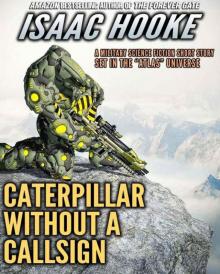- Home
- Isaac Hooke
ATLAS 2 (ATLAS Series Book 2) Page 2
ATLAS 2 (ATLAS Series Book 2) Read online
Page 2
The weight of the thing was crushing, even though the robot was only partially on top of her. Lana thought her hip bones would shatter at any moment.
Lana screamed, as did Shui beside her.
The robot brought its arm far back, servomotors whirring wildly. A polycarbonate fist aimed at Lana’s head—
She lifted an arm to protect herself—
From nowhere a second robot slammed into the first, sending it flying off Lana.
Saving her.
The two robots rolled away, wrestling.
Some of the good spirits remained, then. Or rather, some of the robots still obeyed their internal Constitution.
All robots, even military-grade ones, were hard-coded to protect civilians: the preservation of civilian life overrode everything else. It was called the Machine Constitution. If any harm befell a human being on the open streets, any nearby robots were supposed to come to the aid of said human. There were no conflicting instructions. Nothing that could prevent the Constitution from engaging. Helping a human being in distress was the first priority, and overrode any other task.
A street filled with robots was a safe street, the saying went. No one need to ever fear a mugging, or a heart attack. If someone robbed you, the robots would come to your rescue. If you collapsed in the street, a robot would issue CPR and call an ambulance.
Which was why it was so shocking that the machines, the most devoted supporters of humanity, would attack in the first place.
Shui helped Lana rise. The pavement still shook and rumbled.
It was getting cold, so cold. Lana’s breath misted.
Behind her, robots still flooded the rotunda from the street. The rain was becoming slush.
Lana turned toward the mall entrance—
More robots emerged from the doorway and headed straight for Lana and Shui.
Trapped.
It was over. There was nothing she could do. Not now.
Lana grabbed Shui’s hand, and held perfectly still, waiting for death.
Shui whimpered beside her.
The robots from the mall rushed right past them to meet the robotic attackers emerging from the sleet.
Lana laughed in disbelief, and felt joyous tears trickle down her cheeks.
Behind her, polycarbonate fists met polycarbonate chest pieces, and the clangor sounded like some medieval reenactment battle.
Lana and Shui didn’t wait around to see who would win. Not with those glowing puddles creeping up the rotunda.
The two of them rushed inside the mall. They stumbled occasionally, because of the quaking floor. Once inside the arcade, the air became pleasantly warm.
The mall was connected to the underground pedestrian walkways that formed a warren beneath Shangde City. Those pedways saw little traffic in the summer, and were meant more for the winter months. (Yes, the government had programmed three months of snow into the weather system to better mimic the seasons of Earth, which helped transplanted colonists adapt, according to the scientists.) But at that moment, people rushed toward those distant pedways in droves.
Robots waded through the throng toward the exits. Like most people, Lana and Shui gave the robots a wide berth.
The earthquake abruptly ceased.
Lana paused beside a window. Outside, the rain had been replaced by drifting snow. Gusting winds whirled the flakes across the eerily empty streets. The snow seemed normal, she noted, and wasn’t glowing.
“Let’s go!” Shui said, dragging her onward.
Lana tuned in to the news as she ran.
“The clouds of dust thrown up by the impact have completely occluded the sky. The temperature outside is plummeting, and some areas of the city have reported snow. Reports continue to trickle in regarding robot attacks and deadly rain. The City Defense Corps has issued a bulletin: We are under attack. Stay indoors. Do not leave your place of work or residence. If you are not at home, or in a safe place, take shelter immediately. Stay away from the robots and the glowing liquid if you can.”
That wasn’t helping.
Lana shut off the newscast.
Random people around her abruptly collapsed to the floor: men and women pressed their palms to their ears and squeezed their eyes shut.
Lana had the impression those people were seeing and hearing something no one else did.
Something that drove them mad.
Lana knelt beside one such man. He had the smooth, ageless features and glowing skin of someone who had undergone the rejuvenation treatments. He was rich, then. Probably had an Implant. “What’s wrong? Sir?”
Shui tugged at her shoulder. “Lana! Leave him! Let’s go!”
Lana spoke again, but the man proved unresponsive.
Shui was glancing back nervously. “Leave him!”
Lana decided she would carry him. “Shui, grab his right arm.”
Lana slid her shoulder beneath his armpit and the man rewarded her with an elbow to the face.
She fell backward, landing on her butt. The man was whimpering now, but kept his hands firmly pressed to his ears.
“See?” Shui said, helping her up. “Forget about him!”
Glass broke behind them as a robot leaped through a shop window.
The robot malevolently turned toward them.
“Lana . . .”
A “good” robot intercepted the “bad” one, hurling it to the floor.
Shui and Lana ran. It felt wrong, and rotten, to abandon the man and those others who had fallen, but what was Lana supposed to do? Especially if she was attacked by the very people she intended to save.
Lana proceeded down the wide, shop-lined concourse, finally arriving at the escalators to the lower pedways. She wanted to hurry down, but the press of humanity ahead of her ruled out that option. It was like she was back on Earth all over again.
She and Shui were among the last ones onto the moving stairway. There were a few stragglers who pushed and shoved behind them, but otherwise that was it.
The moving stairway slowly shifted downward. Lana kept her eyes glued to the top of the shaft behind her: she kept expecting a “bad” robot to step onto the escalator.
Lana’s scraped knee and elbow started to throb now that she had stopped moving. Some of the shock was wearing off. She was still scared, but her mind was starting to work again.
The robots were turning against everyone. The world as she knew it was ending.
What was she supposed to do when something like that happened?
She needed time to think. Time to decide what to do.
The robots. There was something about them that tugged at a forgotten memory. She thought of the errand bot that had pinned her down, with its fist raised to strike. The glowing droplets of rain seemed to have accumulated around the chest piece, where the robot’s brain was housed. None of the liquid resided anywhere else on the polycarbonate body, save for a few droplets around the neck.
What did that remind Lana of?
Yes. Now she had it.
She had seen leaked pictures on the Undernet of UC special-forces soldiers who had gone to an unspecified, faraway planet and awakened the Yaoguai, demons from the underworld. These demons had consumed the souls of the soldiers, and possessed their support robots. In the pictures, when a Yaoguai had taken a robot body as its own, a glowing vapor surrounded the chest piece, just above the brain case.
So this was the fault of the evil, bigoted UC, always going places it shouldn’t be going, stirring up trouble better left alone.
It didn’t really matter whose fault it was now though, did it?
The Yaoguai were here, and the people of Shangde City were dying.
Lana tried to bring up the news, but got a “Connection Timeout” error.
“Shui, are you still online?” she said.
“No,” her fr
iend answered.
The crowds thinned out in the multiple corridors of the claustrophobic pedways. The white LEDs on the ceiling gave the underground passageway a washed-out, eerie look.
The problem with the pedways was that they weren’t well labeled. People were expected to access the online map via their aReals, but since the InterPlaNet was down, only those who had their routes memorized made any real headway. Thankfully, Lana had made this journey many times, mostly to avoid the rush-hour crowds on the streets above, and she knew exactly where she was going. Shui followed, trusting her implicitly.
They finally reached a properly labeled branch. Lana glanced at the signage. She was precisely where she had thought she would be.
Lana immediately took the rightmost passage.
“Lana, wait,” Shui said, pointing at the label. “The left passage leads to the port. The right leads downtown.”
“I can read.”
“But you’re going the wrong way!” Shui insisted.
“I want to go downtown.”
“Why, what’s there?” Shui said.
“The hotel.”
“No! We have to get to the port!”
Lana bit her lower lip. “I can’t leave the flight crew behind.”
“We don’t need the crew!” Shui said. “You can pilot the shuttle on your own, can’t you? With the autopilot?”
“I’m not abandoning the crew.”
Shui gritted her teeth. “How do you know they haven’t left already? How do you know they’re not dead?”
Without access to the Net, Lana couldn’t ping the crew to determine either. She wished she’d thought of that earlier, while the Net was still operational.
“I’ll meet you at the spaceport, if you want,” Lana said.
She didn’t have to worry about Shui trying to activate the autopilot on her own. As a stewardess, Shui didn’t have the authorization. That said, the copilot Keai did have authorization, and it was possible he’d already reached the shuttle and abandoned them all. There was no way to know until the Net came back online.
Shui worked her jaw. Finally: “We have to stick together. We retrieve the flight crew, then we go.”
“I’m glad you agree.” Lana found it hard to keep the sarcasm from her voice.
Lana and Shui hurried from pedway to pedway, staying well away from any errand robots they saw. The few humans Lana encountered kept to themselves, the fear plain on their faces as they moved with purpose to wherever it was they were going. Usually she’d find buskers perched beside every underground intersection at this hour, but they’d all packed up and left, save one brave old man who played Beethoven’s “Moonlight Sonata” to the empty corridor on his violin-piano.
Lana tried tuning in to the news again, but the local InterPlaNet node was still down. Implants and aReals were supposed to form adhoc wireless networks with each other when out of node range, bridging the gap to the nearest working node, but the signals those devices produced were weak, and the bridging only worked when a lot of people (or robots) were around to disseminate the packet data.
Lana and Shui reached a wider underground section.
There was one other person present, a woman cradling a baby in her arms. She cowered in one corner, wearing an aReal visor.
When the woman saw Lana, she scrambled over.
“You’re a spaceline pilot,” the woman said in a rush. “It says so on your profile.” Obviously she was using her visor to read the public data Lana had made available on her embedded ID. That was something anyone could do if they got close enough to you, courtesy of the aforementioned adhoc wireless network.
Lana didn’t deny it. Though not for the first time, she wished she had hidden her listed occupation.
“Please, give me and my baby a ride off this moon,” the woman said. “Please.”
“I—” Lana didn’t have the heart to say no. “You can come with us if you want. But there’s no guarantee we’ll make it off this moon. We’re going to the Jinjiang Hotel first, then the port.”
“Thank you.” The woman fell in behind them.
“I’m Lana, and this is Shui.”
The woman nodded. “Mei.”
“We don’t have time to babysit her, Lana,” Shui hissed in a muted tone.
Mei overheard. “I can take care of myself and my baby. I won’t slow you down.”
“You better not,” Shui said. “Or we’re leaving you.”
It was a cold thing to say, but Lana knew she wouldn’t be able to abandon her if it came to it. Shui’s words seemed to have the intended effect however, because though burdened by the baby, Mei kept pace.
The three eventually reached the underground entrance to the hotel. The escalator leading to the lobby no longer had power, so Lana and her companions warily climbed the metal stairway. Their footsteps sounded overloud to Lana’s ears.
The lobby was deserted. Usually the higher-end hotels kept at least one Artificial at the check-in desk at all hours, but not so today. All that remained in lieu of people were the uncanny paintings lining the walls. The subjects were women, dressed in traditional Chinese garb, posing with open fans so that the lower halves of their faces were masked, emphasizing the eyes.
Those paintings made Lana feel like she was being watched.
Not the best decor to have in an abandoned hotel lobby.
She shivered, and not just from the paintings: it was freezing inside.
Lana’s eyes were drawn to the far side of the lobby, where the glass doors of the main entrance had been smashed. Snow drifts formed eerie white piles just inside the doors, while outside the blizzard had intensified to near whiteout conditions.
“This isn’t good.” Shui’s breath misted. “Not good at all. Let’s go back. To the spaceport.”
The port was probably entirely shut down now, given the conditions outside, but she wasn’t about to tell her friend that.
Lana checked the Net.
Still offline.
The hotel would have had its own InterPlaNet node. The fact that the aReals and Implants of the hotel guests didn’t form a data bridge to the next node told her that the hotel was nearly empty of both humans and robots. Assuming the robots hadn’t simply disabled their network nodes.
And also assuming that the InterPlaNet nodes weren’t down citywide . . .
Lana had to know for certain whether the flight crew was here, so she tiptoed into the lobby, making her way toward the elevators.
In the middle of the lobby she passed a toppled luggage cart. Travel bags were scattered on the floor alongside it; one of the suitcases had broken open, leaving clothes splayed across the dark tiles. There was a small pool of blood beside the cart.
So far, Mei managed to keep her baby quiet. Lana hoped that would continue to be the case; their lives could very well depend on it.
Though the main lights remained on, the power had been cut to the elevators, so the three of them were forced to take the stairwell.
Lana and Shui set a good pace, and to Mei’s credit, she kept up.
On the eighth floor, Lana opened the exit door and peered out.
The long hall seemed empty. The doors lining either flank were shut. A ninety-degree bend at the far side led to the remaining rooms.
It was somewhat warmer up there, but Lana’s breath still misted slightly when she spoke. “Here we go,” she said.
She led her companions to door number 801, the room of her copilot, Keai. She knocked. No answer.
She tried again. “It’s Lana,” she said, softly.
The main hallway lights abruptly flicked off, and the emergency lights kicked in.
“Lana . . .” Shui said.
Lana checked the Net one last time.
Still down.
She tore off her aReal sunglasses: she could see better without
them in the dim light.
She hurried now, moving from door to door. The spaceline crew had reserved the first nine rooms on this floor; she knocked on each and every one of the designated doors and quietly identified herself, but no one answered.
A beam of light appeared at the far end of the hall, coming from around the bend.
Lana heard the characteristic whir of a servomotor.
“This way,” Lana whispered. She led her companions to the room she shared with Shui. The door unlocked immediately at her approach, which meant the hidden sensors in the door still had power, thankfully.
They all piled inside and Lana shut the door behind them. The curtains were closed, and the scant sunlight that managed to filter inside gave the room a gloomy quality.
The baby whimpered, seeming on the verge of an all-out bawling session. Mei perched on the edge of the bed and made desperate cooing sounds as she rocked the child.
Lana didn’t think it was going to work. She was positive the baby sensed the frantic mood of everyone in the room and was going to reveal them to the approaching robot outside.
But then the child miraculously calmed down.
Shows how little I know about babies, Lana thought. Maybe children had a sixth sense of some sort, warning them when danger was near. Whatever the case, the baby did not cry.
Lana and Shui listened by the door as the heavy footsteps heralding the approach of the robot grew in volume.
When the footsteps were right outside, the robot halted.
Lana and Shui remained very still. Neither of them dared gaze through the fisheye lens of the peephole.
Mei had clamped her hand around the baby’s mouth, and Lana was afraid the child might suffocate. She almost moved toward the bed to force the woman’s hand down.
But she did not.
Her own self-preservation instinct had kicked in, and she couldn’t move or make a sound if she wanted to.
She hated herself in that moment.
The footsteps resumed, continuing toward the stairwell. Those heavy thuds receded as the robot descended to the floor below.
Lana slumped against the door.
Shui let out a long breath.

 Warden 2
Warden 2 Devastator
Devastator Warden 4
Warden 4 Emperor
Emperor Mech
Mech Conqueror
Conqueror Fighter
Fighter The Forever Gate Ultimate Edition
The Forever Gate Ultimate Edition Defiler
Defiler Mech 2
Mech 2 Warden 3
Warden 3 Warden 1
Warden 1 Mech 3
Mech 3 Forerunner
Forerunner The Alliance (AI Empire Book 2)
The Alliance (AI Empire Book 2) Breaker (Monster Tamer Book 1)
Breaker (Monster Tamer Book 1) Bender of Worlds
Bender of Worlds The Pendulum Swings (The Forever Gate Book 8)
The Pendulum Swings (The Forever Gate Book 8) The Link
The Link Just Another Day
Just Another Day Star Warrior
Star Warrior Alien War Trilogy 1: Hoplite
Alien War Trilogy 1: Hoplite Battle Harem 3
Battle Harem 3 The Ethan Galaal Series: Books 1 - 3
The Ethan Galaal Series: Books 1 - 3 Reloaded
Reloaded Robot Dust Bunnies (Argonauts Book 5)
Robot Dust Bunnies (Argonauts Book 5) Battle Harem
Battle Harem ATLAS 3 (ATLAS Series Book 3)
ATLAS 3 (ATLAS Series Book 3) Argonauts 2: You Are Prey
Argonauts 2: You Are Prey Worlds at War (A Captain's Crucible Book 5)
Worlds at War (A Captain's Crucible Book 5) Operation: Bug Spray (Argonauts Book 9)
Operation: Bug Spray (Argonauts Book 9) Battle Harem 2
Battle Harem 2 Redeemed (Bolt Eaters Trilogy Book 3)
Redeemed (Bolt Eaters Trilogy Book 3) Atlas
Atlas Argonauts 1: Bug Hunt
Argonauts 1: Bug Hunt Reactivated (Bolt Eaters Trilogy Book 1)
Reactivated (Bolt Eaters Trilogy Book 1) Alien War Trilogy 3: Titan
Alien War Trilogy 3: Titan Flagship (A Captain's Crucible #1)
Flagship (A Captain's Crucible #1) Caterpillar Without A Callsign
Caterpillar Without A Callsign The Forever Gate
The Forever Gate He Who Crosses Death (Star Warrior Quadrilogy Book 3)
He Who Crosses Death (Star Warrior Quadrilogy Book 3) Reforged (Bolt Eaters Trilogy Book 2)
Reforged (Bolt Eaters Trilogy Book 2) Refurbished
Refurbished Reloaded (AI Reborn Trilogy Book 2)
Reloaded (AI Reborn Trilogy Book 2) He Who Crosses Death
He Who Crosses Death Explorations: First Contact
Explorations: First Contact Planet Killer (A Captain's Crucible Book 4)
Planet Killer (A Captain's Crucible Book 4) Quantum Predation (Argonauts Book 4)
Quantum Predation (Argonauts Book 4) Clandestine-IsaacHooke-FreeFollowup
Clandestine-IsaacHooke-FreeFollowup The Last Stand (The Forever Gate Book 9)
The Last Stand (The Forever Gate Book 9) City of Phants (Argonauts Book 6)
City of Phants (Argonauts Book 6) Test of Mettle (A Captain's Crucible Book 2)
Test of Mettle (A Captain's Crucible Book 2) Cradle of War (A Captain's Crucible Book 3)
Cradle of War (A Captain's Crucible Book 3) Rade's Fury (Argonauts Book 7)
Rade's Fury (Argonauts Book 7) Rebirth (The Forever Gate Book 6)
Rebirth (The Forever Gate Book 6) The Forever Gate Compendium Edition
The Forever Gate Compendium Edition Mechs vs. Dinosaurs (Argonauts Book 8)
Mechs vs. Dinosaurs (Argonauts Book 8) Alien War Trilogy 2: Zeus
Alien War Trilogy 2: Zeus ATLAS 2 (ATLAS Series Book 2)
ATLAS 2 (ATLAS Series Book 2) Operation_Bug Spray
Operation_Bug Spray